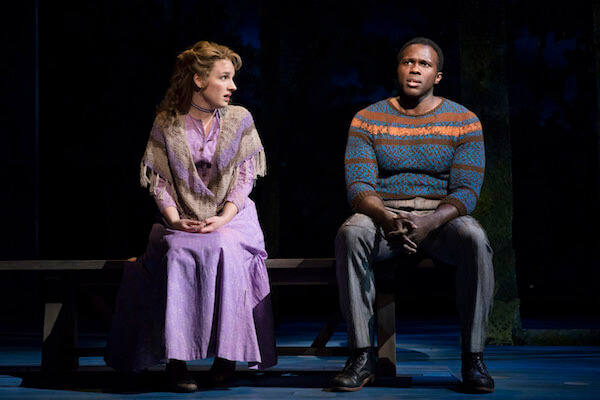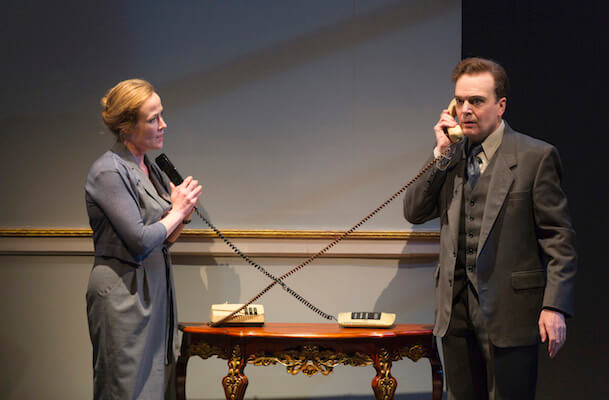BY CHRISTOPHER BYRNE | Here’s a little game you can play as you try to resist nodding off — and you’ll have to try hard — during “King Charles III” at the Music Box: Which Shakespeare play is Mike Bartlett invoking as he tells the tale of the monarchy in crisis now that Queen Elizabeth is dead and long-waiting, presumably long-suffering Charles has ascended the throne, though is not yet officially crowned? You can divert yourself trying to figure out which of the Richards or Henrys are being invoked as the cast rambles on in iambic pentameter. If you’re a real Shakespeare fan, you can try to figure out which speech he is aping. Shakespeare has been mimicked, down to the low comic scenes and even a ghost, and while the attempt to create a modern history play in the style of the Bard is clever, the play never overcomes its conceit (in both meanings of the word) to become vital theater.
The characterizations are fantasies, inspired what little is publicly known about the personal lives of the royals as well as by tabloid fodder. Now, it’s not that Shakespeare had so much more to work with for the monarchs he portrayed and, to be honest, Shakespeare is often tedious, but “Charles III” as a play never rises above an intellectual and speculative exercise to provide characters we can care about or a believable conflict. Rather, the play aims to be notorious, daring to question and criticize the monarchy while most of the major players are still alive.
The plot centers on the crisis that ensues when Charles refuses to sign a bill Parliament has passed limiting the rights of the press to invade personal lives (oddly, something one might expect Charles, of all people, to favor). His contrarian posture, however, threatens to undo him. Amid policy chatter that echoes the mind-numbing discussion of succession in the opening of “Henry V,” we learn that Charles’ signature is largely ceremonial but essential nonetheless. What follows is a family brouhaha as William takes on his father and emerges as a populist leader, Kate is exposed as a political manipulator, and Harry is seen as a wastrel with a commoner for a girlfriend. In times, everything falls apart and Charles becomes unhinged. There is no bloody battle at Agincourt offstage, but there are popular protests — presumably the modern equivalent — that leave Charles barricaded in the castle as history seems to pass him by. The story ultimately wears thin, and the two-and-a-half hours of traffic on the stage leaves us neither caring nor enlightened.
Three productions designed to toy with you
Still, the cast is quite good. Tim Pigott-Smith does a full-on Henry IV evolving into Lear, biting into the role — and the scenery — with appropriate ferocity. Oliver Chris as William is commanding, and Richard Goulding is antic and passionate as Harry. Lydia Wilson as Kate is probably the most human of all the characters. The rest are largely “ciphers to this [would-be] great accompt,” as Shakespeare writes in the prologue to “Henry V.” Still, director Rupert Goold does manage keep the plot from plodding too much.
One has to give the production the credit for being savvy and commercial. It is tailor-made to allow anyone who took an undergraduate Shakespeare survey course to feel smugly smart — even as it panders to tabloid appetites. It’s the kind of move that wins awards and accolades, no matter how scantily clad the emperor — well, okay, the king — actually is.
If you’re in the mood for something silly and diverting, get over to New World Stages and indulge yourself in the charm of “Shear Madness,” an interactive whodunit propelled by a hair-thin plot, improvisation, and audience participation. It’s a hoot. There has been a murder above the beauty parlor where the play is set and the audience is engaged in solving it. Simply put, it’s a stage version of the murder mystery games that were popular in the 1970s and ’80s — about the time this show was first seen in Boston.
Clues are dropped, the cast cracks one another up, and the audience goes along for the ride. It’s that simple. The current production is especially fun given the talents of the cast at pulling the whole thing off at breakneck pace. Jordan Ahnquist as Tony is brilliant with spontaneous comedy, and he’s charmingly abetted by a company that includes Adam Gerber, Kate Middleton, Lynne Wintersteller, Patrick Noonan, and Jeremy Kushnier. They work together with farcical clockwork, and Noonan does a great job of managing the audience participation part.
This is not so much a play as it is a very successful party game. It’s well done and diverting — and they sell drinks in the theater. Enjoy!
There are two things one wants from Stephen King: a great story and some chills up the spine. That’s certainly what his novel “Misery” delivered, and it’s exactly what you’ll get in William Goldman’s stage adaptation now at the Broadhurst. To ask “Misery” to do or be anything else is either unreasonable or wishful thinking.
The story of writer Paul Sheldon who is rescued then imprisoned then tortured by his “biggest fan” Annie Wilkes is a classic, thanks to the 1990 movie that won Kathy Bates an Academy Award as Annie. As directed by Will Frears, “Misery” is completely entertaining and not particularly demanding. The highlight of the evening is Laurie Metcalf’s creepy and precise portrayal of Annie whose madness and delusion vacillate between hilarious and harrowing. She bears the brunt of the work, and it’s a detailed performance that even with the excesses of the character manages to be believable and — at times — sympathetic. Bruce Willis, who is immobile throughout much of the play, is forced to be subtler in his performance, but he captures Sheldon’s universal fear of being trapped and at the mercy of a crazy person. His search for a way out is delivered with nuance.
David Korins creates an ingenious and thoroughly appropriate set that wonderfully supports the story’s dramatic tension. Ann Roth’s costumes and David Weiner’s lighting similarly create a remote and claustrophobic world.
It’s not easy to create a stage thriller, and “Misery” happily delivers.
KING CHARLES III | Music Box Theatre, 239 W. 45th St. | Through Jan. 31: Tue., Thu. at 7 p.m.; Wed., Fri.-Sat. at 8 p.m.; Wed., Sat. at 2 p.m.; Sun. at 3 p.m. | $37-$149 at telecharge.com or 212-239-6200 | Two hrs., 30 mins., with intermission
SHEAR MADNESS | New World Stages, 350 W. 5oth St. | Mon. at 7 p.m.; Wed.-Sat. at 8 p.m.: Sat . at 2 p.m.; Sun. at 3 p.m.| $49.50-$79.50 at telecharge.com or 212-239-6200| Two hrs., with intermission
MISERY| Broadhurst Theatre, 235 W. 45th St. | Tue.-Thu. at 7 p.m.; Fri.-Sat. at 8 p.m.: Wed., Sat. at 2 p.m.; Sun. at 3 p.m. | $69-$147 at telecharge.com or 212-239-6200 | Two hrs., with intermission





































